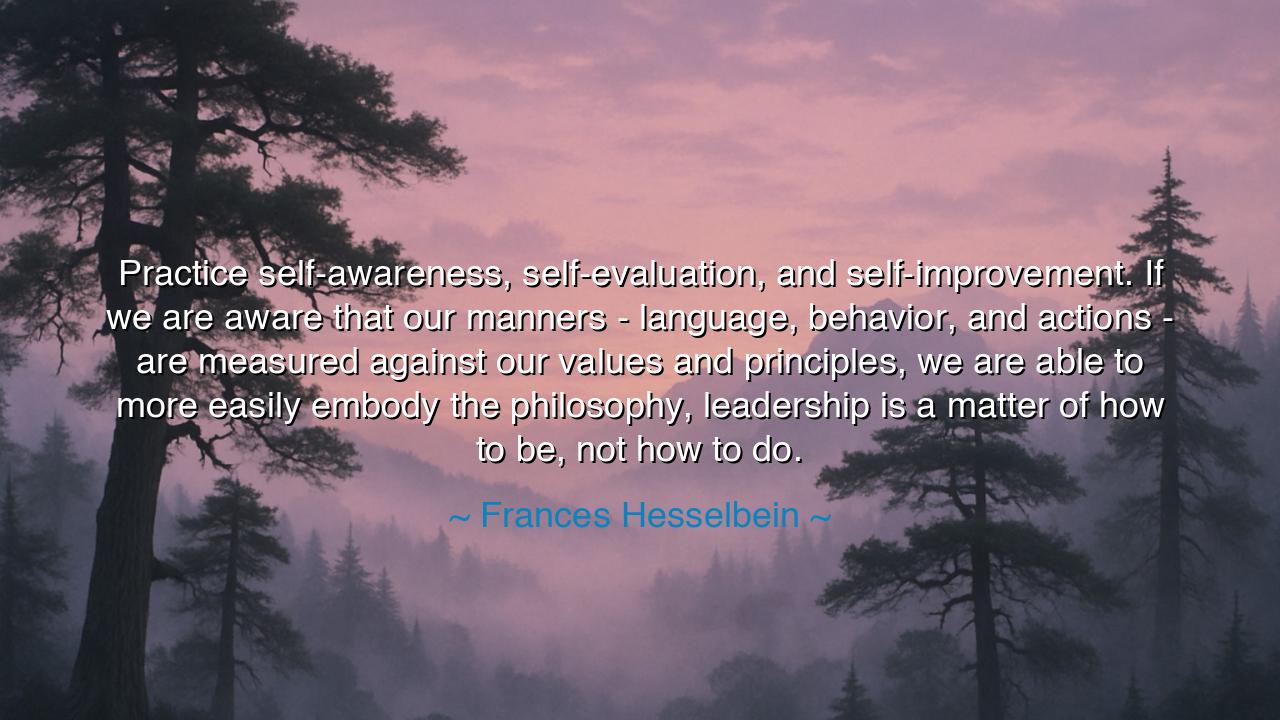
Practice self-awareness, self-evaluation, and self-improvement.
Practice self-awareness, self-evaluation, and self-improvement. If we are aware that our manners - language, behavior, and actions - are measured against our values and principles, we are able to more easily embody the philosophy, leadership is a matter of how to be, not how to do.






“Practice self-awareness, self-evaluation, and self-improvement. If we are aware that our manners—language, behavior, and actions—are measured against our values and principles, we are able to more easily embody the philosophy, leadership is a matter of how to be, not how to do.” – Frances Hesselbein
In this radiant teaching, Frances Hesselbein, one of the most visionary leaders of the modern age, speaks to the ancient and enduring truth that leadership begins within the self. Her words call not to the noise of command or the mechanics of management, but to the still, sacred chamber of the soul where character is forged. To “practice self-awareness, self-evaluation, and self-improvement” is not merely an exercise in discipline—it is the journey of transformation. It is the awakening of the leader’s heart, the refinement of the inner compass that guides action with integrity and grace. For leadership, as she reminds us, is not about doing more, but about being more—more conscious, more authentic, more aligned with truth.
The meaning of this quote lies in its quiet power. Hesselbein speaks of three sacred practices—awareness, evaluation, and improvement—as the foundation of all true leadership. Self-awareness is the mirror that reveals who we truly are; self-evaluation is the discipline of measuring that image against our ideals; and self-improvement is the courage to change what must be changed. In this triad, leadership is revealed not as authority, but as mastery of the self. When our actions flow in harmony with our principles, leadership ceases to be performance—it becomes presence. It is the art of embodying what we wish others to follow.
The origin of this philosophy comes not from boardrooms or titles, but from the life of Hesselbein herself. Born into humble beginnings, she rose to lead the Girl Scouts of the USA, transforming it into one of the most respected organizations in the world. She did not lead by imposing her will, but by embodying her values—respect, service, and excellence. Her leadership was not defined by decrees, but by example. She once said, “We are not what we say we are; we are what we do.” Yet even more deeply, she understood that what we do is born from what we are. Thus, her legacy teaches that to lead others is first to govern oneself, to bring one’s words, actions, and soul into alignment with one’s highest ideals.
History echoes her wisdom. Consider Marcus Aurelius, the philosopher-emperor of Rome, who in his Meditations wrote daily not about the empire he ruled, but the self he sought to master. Surrounded by power and temptation, he turned inward, asking whether his actions were just, his words kind, his heart uncorrupted. Like Hesselbein, he believed that leadership is being, not doing. It is the inner vigilance that ensures one’s rule—whether over nations or one’s own heart—is guided by virtue. In this, he and Hesselbein are kindred spirits across centuries: both teaching that the leader’s greatest battle is not against others, but against the shadows within.
When Hesselbein speaks of manners, language, behavior, and actions, she reminds us that these are the reflections of our inner state. A leader who has not mastered the self will reveal disorder through impatience, arrogance, or fear. But one who lives in awareness and humility becomes a beacon—calm in chaos, kind in conflict, steadfast in uncertainty. To “embody the philosophy” means to let one’s life itself become the lesson—to live so authentically that others need not hear your words to know your truth. Leadership, then, becomes a form of art—the art of living one’s principles so beautifully that others are inspired to do the same.
The power of Hesselbein’s teaching lies also in its moral simplicity. Leadership, she says, is not a matter of tactics or technique, but of being—a word that implies stillness, essence, and integrity. We live in an age that worships speed and strategy, yet forgets the strength of character. But the ancients knew, as she knows, that the greatest leaders—from Confucius to Gandhi—were not those who conquered lands or markets, but those who conquered themselves. To lead is to live consciously, to ensure that each word and gesture is consistent with one’s deepest values.
And so, the lesson we must take from her wisdom is this: before we seek to change the world, we must first change the self. Let each day begin with quiet reflection—Who am I today? Do my actions honor my principles? Does my manner reflect the truth I claim to serve? In this practice lies the secret of unshakable leadership. The world does not need more people who can command armies or manage systems—it needs souls who can command themselves. For as Frances Hesselbein teaches, leadership is not what we do, but what we are—and when we are whole, our actions, our words, and our lives become instruments of light for all who follow.






AAdministratorAdministrator
Welcome, honored guests. Please leave a comment, we will respond soon